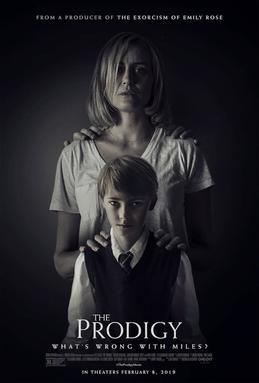Back in 1976, “The Omen,” directed by Richard Donner, changed the genre of horror by introducing audiences to the horrifying sub-genre of child possession. Since then, Hollywood has systematically churned out a couple of these films a year. So it was no surprise that even this early in the year, “The Prodigy” landed in theaters.
“The Prodigy,” directed by Nicholas McCarthy, follows the story of Miles, a supposed super-smart kid who is battling with an evil Hungarian spirit that has come back into the physical world to complete some unknown business. The plot is fairly formulaic, and McCarthy doesn’t dare to stray far from the beaten path of genre filmmakers before him. However, despite the reuse of horror tropes seen in nearly every Hollywood-produced horror film, McCarthy is clearly building toward an ending he believes to be a surprising, dark twist.
The ending is the only somewhat fresh aspect of the film, but not for the reasons that McCarthy clearly thinks. Recent horror films, especially in the last decade, are almost always a box office success. However, this comes at an unfortunate price for true horror fans. Producers know horror films will make money, so they produce films they believe will reach the largest audience. These films are tame and tend to stick to a few generic horror mechanisms to tell the story, rather than staying true to the original purpose of horror, which was to push the boundaries of storytelling without a care to the box office return.
In comparison to recent horror films, McCarthy’s film has a great, original ending. However, in the context of the horror genre, having an especially dark ending is nothing special. For decades, horror films have pushed viewers to the edge of their comfort level, so for hardcore horror fans, “The Prodigy” will be nothing new.
Although the ending is admirable in the face of many robotic and bland Hollywood-produced horror films, the rest of the movie is as standard as they come. The actual plot of the film is so loose that McCarthy doesn’t really bother explaining anything. He casually hits all the points that he clearly needed to so he could receive Hollywood production money. The lack of directing is so evident that the scenes without horror elements fizzle out long before the next sequence of horror.
Paired with the lazy directing job, Jeff Buhler’s screenplay has dialogue that is worse than most home movies. There is a scene in which the father of the film, played by Peter Mooney, utters dialogue that is very similar to the infamous “You’re tearing me apart, Lisa” line from Tommy Wiseau’s “The Room.” The dialogue is so laughably bad it seems like a child wrote it.
Although the film is predictable and the screenplay is downright awful, the resurgence of the horror genre in the last few years is worth the pain of sitting through the misfires. “The Prodigy” struggles to be its own film, but its attempt is a step in the right direction for Hollywood filmmakers. The horror genre has swayed in recent years toward a formulaic, cash-grab for producers all over the country, but “The Prodigy” shows a little progress toward the boundary-pushing horror films that define the genre.
Cole Fowler is an English junior and columnist for The Battalion.
‘The Prodigy’ is over-reliant on its dark ending
February 10, 2019

Photo by Via IMDb.com
Life and arts reporter Cole Fowler said new horror film fails to even meet basic expectations.
0
Donate to The Battalion
$2065
$5000
Contributed
Our Goal
Your donation will support the student journalists of Texas A&M University - College Station. Your contribution will allow us to purchase equipment and cover our annual website hosting costs, in addition to paying freelance staffers for their work, travel costs for coverage and more!
More to Discover








